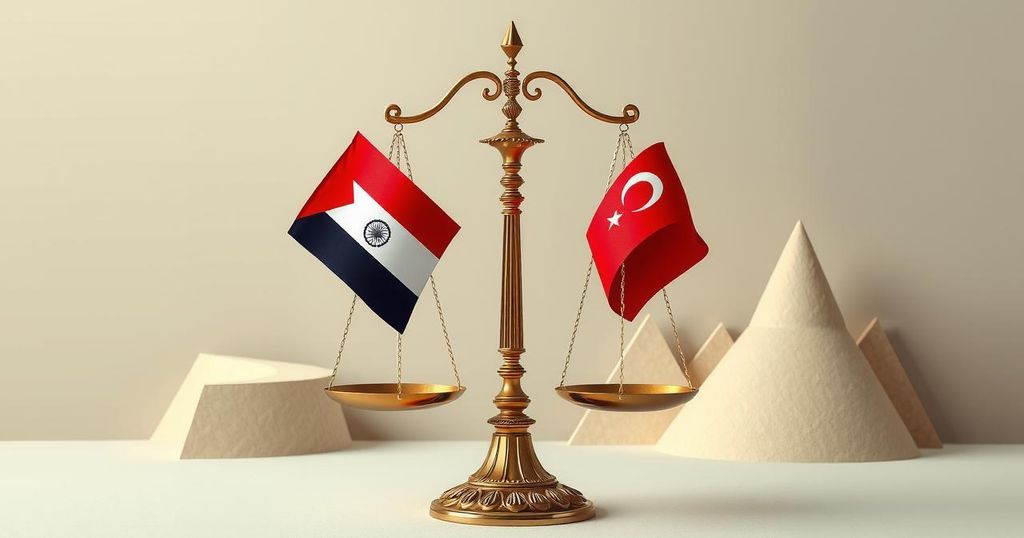Syria’s interim President Ahmed al-Sharaa is navigating complex relationships with Turkey and Saudi Arabia, seeking to balance their influences as competition heightens for control over the country’s future. Visits to both capitals indicate a strategic maneuver, although analysts highlight that the ultimate direction of Syria will center around Damascus, amid differing regional agendas and Turkey’s economic challenges.
Syria’s interim President Ahmed al-Sharaa recently conducted diplomatic visits to both Ankara and Saudi Arabia, indicating a strategic attempt to balance relations with these influential regional powers amid increasing rivalry for influence over Syria’s future. In Ankara, Turkish President Recep Tayyip Erdogan warmly welcomed Sharaa, emphasizing a desire for enduring friendship and collaborative efforts for Syria’s reconstruction, a sentiment echoed by Sharaa as he acknowledged Turkey’s crucial support for Syria’s political and economic stability.
While Sharaa fostered strong ties with Turkey during the Syrian conflict, where Turkey sheltered many refugees and protected the Idlib enclave, analysts caution against overestimating Turkey’s ability to influence Syrian policy. The ultimate governance and decision-making remain centered in Damascus, emphasizing Arab nationalism over Turkish perspectives. Despite no significant agreements emerging from their meeting, the cordial discussions included future cooperation in security and development.
Notably, Sharaa’s earlier visit to Saudi Arabia highlights the complex dynamics at play, as he navigates relations between Turkey and its regional rival. Experts assert that Sharaa’s identity as an Arab nationalist may lead to divergent views on critical issues in the long term. Meanwhile, Turkey’s economic constraints may inhibit its capacity to significantly contribute to Syria’s reconstruction compared to wealthier Saudi counterparts.
As Sharaa appears committed to a pragmatic approach, he has shown willingness to engage with various stakeholders, including Russia. Turkey’s military presence in Syria, aimed at combating Kurdish insurgents, could also create future tensions. Concurrently, Iran is re-evaluating its strategy towards Syria, shifting its stance in light of the new leadership, which may alter regional alignments.
Experts note that although Turkey possesses valuable resources and expertise for Syrian reconstruction, the dynamics of influence are shifting as Syria seeks broader alliances. The outcome of Sharaa’s balancing act between Ankara and Riyadh remains to be seen as both nations vie for greater stakes in Syria’s political landscape.
The regional competition for influence in Syria has intensified following years of conflict. Syrian President Ahmed al-Sharaa’s diplomatic engagements with both Turkey and Saudi Arabia reflect this growing rivalry. Turkey played a pivotal role in supporting Syrian rebels and hosting many refugees, while Saudi Arabia has historically been at odds with Turkey regarding leadership in the region. Analysts emphasize the importance of balancing ties with these influential countries as Syria rebuilds and redefines its political landscape.
In conclusion, President Ahmed al-Sharaa’s diplomatic efforts reveal his strategic maneuvering between Turkey and Saudi Arabia amidst their ongoing regional rivalry. While Turkey has shown a significant commitment to aiding Syria’s reconstruction, the leadership in Damascus may gravitate towards Saudi Arabia due to historical ties and differing political ideologies. As these dynamics evolve, the balance of influence in Syria remains precarious, with various global actors, including Iran and Russia, keenly observing and adapting to the new leadership.
Original Source: www.rfi.fr




